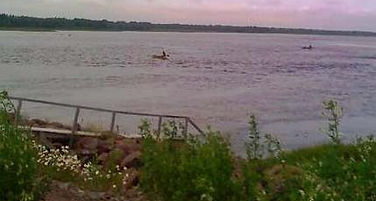Conservation Biology in the Boreal
HOW DOES NEWFOUNDLAND and LABRADOR COMPARE??
Conservation Efforts
Conserving coastal and ocean regions now for the province is essential to sustain the resources for the future. In a strategy released June 2011, it was announced that $900,000 is going into the conservation coastal and ocean management strategy and policy framework, this is a long term plan to sustain the use of coastal and ocean resources in Newfoundland and Labrador.
Ocean resources are a major source of income for the economy for this province, to sustain these resources a healthy ocean ecosystem must be maintained. With this money, over three years the technology and research will determine how much we are negatively impacting out waters, and from there more strategies can be developed.
This strategy provides a long term vision for planning and management of the provinces coastal and ocean areas and resources. The strategy encompasses;
- Having a healthy marine environment
- Coastal land use planning
- Climate change
- Competing needs and interests
- Coastal and marine infrastructure
- Social, cultural and economic sustainability
This province in the first jurisdiction to implement such a strategy.

Newfoundland
Canada
Atlantic Canada has many research projects in collaboration with DFO underway to aid in the development of conservation strategies, these are some examples.
Indicators of coastal ecosystem health
This program is run through Dalhousie University, but similar to the finfish aquaculture site development program being ran in Newfoundland. The effort of this program is to determine what indicators will determine the state of the ecosystem beyond the immediate site of the fish farm. The waste products could be having a very negative effect on the environment.
Mussel culture carrying capacity in St. Ann's Bay
This project’s aim is to find the carrying capacity of an ecosystem by modeling the suspension feeding activity of the mussels and the chlorophyll depletion in the water. After assessing the environmental risks, in 2003 Nova Scotia was approved for the largest single mussel aquaculture in the Maritimes.
Development of aquaculture management plans for PEI aquaculture areas
This research is dominated by oyster farming, as it is the fasting growing sector of aquaculture in PEI. There needs to be conservation and management strategies put in place with this increase. Foxley river has management strategies put in place to sustain this area and be a productive area to farm shellfish.

International
Conservation plans are being developed in a report entitled, “Incidence and impacts of escaped farmed Atlantic Salmo salar in nature: with contributions from; Norwegian Institute for Nature Research, Norway, Ocean Science Center, Memorial University, Newfoundland, Marine Institute, Ireland, Aquaculture Management and Conservation Service, United Nations, Institute of Marine Research, Noway, Atlantic Salmon Federation, New Brunswick .While these efforts will not eliminate ecological ramifications of aquaculture, they may be able to reduce them significantly. Genetic effects of interbreeding, decreased fitness in future generations and competition can be reduced by the use of sterile fish in fish farms, this however would have no effect on the transmission of sea lice, other parasites and diseases.
It is emphasized by the members working in this group that the most beneficial and thus pressing research priorities are; technologies and efforts for containment, to prevent escape, and approaches to reduce the impacts of escapes. It was found that in every country participating in this research escapes of fish farms negatively affect those in the native populations.
Uniting the most advanced aquaculture in Coastal regions will provide the best information about the field and therefore conservation efforts can be maximized.
“Our province (NL) is leading the way in coastal and ocean management within Canada,” said the Honourable Clyde Jackman, Minister of Fisheries and Aquaculture, 2011.
Foxley River, NB
Source: http://www.dfo-mpo.gc.ca/science/enviro/aquaculture/rd2011/aqua-eng.html
Contributers to "Incidence and impacts of escaped farmed Atlantic Salmo salar In nature"
��Source: NINA special report 36

Atlantic Salmon Collection in Newfoundland.
Source:http://www.dfo-mpo.gc.ca/science/enviro/aquaculture/rd2011/aqua-eng.html